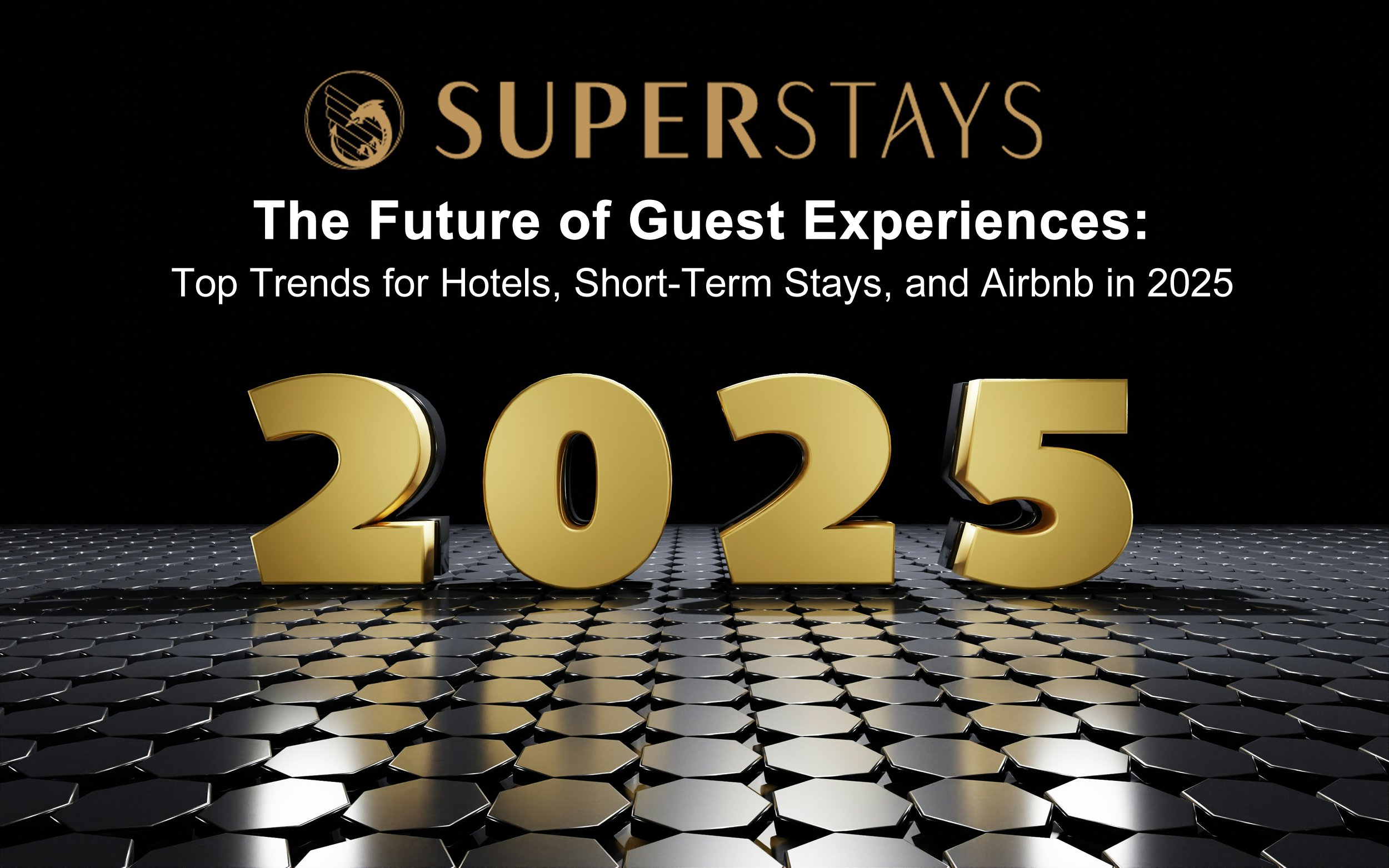The Future of Guest Experiences: Top Trends for Hotels, Short-Term Stays, and Airbnb in 2025
As we enter 2025, the hospitality industry is poised for a transformative shift. From personalized guest services powered by artificial intelligence (AI) to sustainable practices and immersive, tech-driven experiences, how travelers interact with their accommodations is evolving rapidly. Whether it’s a luxury hotel, short-term rental, or Airbnb stay, innovation, flexibility, and meeting guests’ changing expectations will be the key to staying competitive in the coming years.
Here are some of the top trends that are shaping the guest experience for 2025, along with examples of how these trends are already being implemented:
1. Personalization and AI-driven Experiences
In 2025, personalization will be the cornerstone of guest satisfaction. AI-driven technologies will enable hotels and short-term rental properties to offer unique experiences. Bright rooms will adjust lighting, temperature, and entertainment options based on individual preferences, creating a truly customized stay.

Example:
Marriott’s Mobile App: Marriott’s app already allows guests to control room features like lighting, temperature, and TV channels. By 2025, we can expect even more sophisticated AI-powered personalization, such as the app adjusting settings based on guest data (e.g., preferred room temperature or type of coffee).
Airbnb’s Experiences: Airbnb has begun offering personalized experiences. Hosts can tailor activities based on guests’ interests, like private cooking lessons or local art tours, leveraging AI to recommend the best options.
Alongside this, AI will enhance communication between guests and hosts, with chatbots and virtual concierges providing real-time support for everything from booking and check-in to local recommendations. By analyzing guest data, properties can anticipate needs and create bespoke experiences—from welcome amenities to personalized room settings based on previous stays.
2. Sustainability and Eco-Friendly Stays
Sustainability is no longer a niche consideration—it’s becoming a defining feature of modern hospitality. By 2025, eco-conscious travelers will have more options for sustainable stays, with hotels and Airbnb hosts prioritizing energy-efficient appliances, water-saving technologies, and waste reduction. Many properties will seek green building certifications, renewable energy sources, and sustainable sourcing to appeal to environmentally aware guests.

Example:
The Green Hotel Certification: Hotels like The Kimpton Hotel in New York are already going green by using energy-efficient appliances, offering eco-friendly amenities, and reducing their environmental footprint. This trend will expand across the industry by 2025.
Airbnb’s “Green” Listings: Airbnb has already introduced an option to search for eco-friendly listings. By 2025, this feature will be expanded with more properties adopting green standards, such as solar-powered homes, sustainable materials, and water-efficient systems.
Additionally, platforms like Airbnb may integrate carbon offset options directly into the booking process, allowing travelers to make more sustainable choices easily. Green hotels and short-term rentals will not only offer eco-friendly amenities but also create experiences that promote environmental responsibility.
3. Health and Wellness
Health-conscious travelers will continue to drive the demand for wellness-focused experiences. By 2025, wellness tourism is expected to become a mainstream offering, with properties providing specialized packages that include yoga, meditation, fitness facilities, and organic food options.

Example:
Six Senses Hotels: Known for its focus on wellness, it offers tailored wellness programs that include yoga, fitness, nutrition, and meditation retreats. Expect more hotels to follow suit with similar offerings by 2025.
Airbnb Wellness Stays: Airbnb already offers a selection of properties that focus on wellness, such as homes with meditation spaces or serene environments. In the future, these offerings will be enhanced with services like in-home massage or customized wellness plans.
Sleep quality will also become a priority for hotels and short-term rental properties. Expect enhanced sleep features such as high-end mattresses, blackout curtains, soundproofing, and noise-canceling technology to promote better rest and recovery during guests’ stays.
4. Immersive and Experiential Stays
As travelers seek more unique, memorable stays, hotels, and short-term rentals will focus on delivering immersive experiences. Expect themed accommodations that reflect local culture, history, or specific lifestyles—whether a music-themed hotel, an art-inspired Airbnb, or a wellness retreat.

Example:
Themed Hotels: Hotels like the Aria in Las Vegas offer immersive, tech-driven experiences, such as using digital art and high-tech rooms to create a fully personalized environment. By 2025, expect more hotels to integrate immersive themes like local culture or art.
Airbnb Unique Stays: Airbnb has seen a surge in unique properties, such as treehouses, tiny homes, and artist studios, which create an immersive experience for guests. Expect more themed, experiential stays to emerge, such as “living history” homes or eco-lodges offering nature-focused experiences.
Advancements in augmented reality (AR) and virtual reality (VR) will also significantly enhance guest experiences. Interactive rooms equipped with these technologies could offer guests immersive entertainment or even virtual city tours, enabling them to engage with their environment innovatively.
5. Tech-Enabled Self-Service
The shift toward tech-enabled, self-service accommodations will continue to gain momentum. Guests will enjoy seamless check-in and check-out processes, often using mobile apps for keyless entry and automated concierge services. This move toward contactless interactions will increase convenience and streamline operations for hosts and hotel staff.

Example:
Marriott and Hilton’s Mobile Check-In: Both Marriott and Hilton are already offering mobile check-ins and keyless room entry through their apps, enabling guests to bypass the front desk altogether. Expect this trend to expand, making check-in and service even more seamless.
Robot-Assisted Hotels: Some hotels, like the Henn-na Hotel in Japan, already use robots for various tasks, including check-in, concierge, and room service. By 2025, this technology will likely become more widespread, improving the guest experience.
Robotic services will also play a growing role in hospitality. From robots delivering room service to virtual concierges managing guest requests, technology will make everyday operations more efficient while enhancing the overall guest experience.
6. Flexible and Dynamic Pricing
In 2025, the pricing model for accommodations will be more flexible than ever. Expect to see on-demand booking options that allow travelers to book last-minute deals or secure accommodations based on dynamic pricing that fluctuates depending on demand, location, and length of stay.

Example:
Dynamic Pricing Platforms: Services like Priceline and Expedia are already experimenting with dynamic pricing. By 2025, these platforms will offer more flexibility, allowing guests to choose from a broader range of price points depending on when they book and how flexible they are with their travel dates.
Subscription Models by Airbnb: Airbnb has explored subscription services for frequent travelers, offering discounted rates and exclusive access to unique properties. These models will likely become more widespread in the future, offering greater value for frequent guests.
Subscription models may also become more popular. In these models, guests pay a monthly or annual fee to access a range of properties and exclusive services. This could offer flexibility and savings for frequent travelers, such as digital nomads or business professionals.
7. Social and Community-Centric Stays
As social experiences become more important to travelers, co-living spaces will become a significant trend. These spaces blend accommodation with shared workspaces and communal areas, catering to remote workers, digital nomads, and long-term travelers. They’ll offer opportunities to socialize, collaborate, and create connections while traveling.

Example:
Airbnb for Co-Living: Airbnb already offers long-term rentals for digital nomads, and by 2025, it may expand its offerings to include more community-driven spaces designed for group work, social activities, and collaboration.
Similarly, short-term rentals and large hotels will continue to focus on group travel. Properties designed for family reunions, group vacations, or corporate retreats will offer communal spaces alongside private accommodations, encouraging guests to bond and share experiences.
8. Enhanced Security and Trust
As security concerns grow, hotel chains and short-term rental platforms prioritize guest safety. Enhanced verification systems, including background checks for hosts and guests, will become more common. Properties will also incorporate digital ID checks for smooth, secure check-ins.

Example:
Airbnb’s Verified ID: Airbnb has already implemented a system for verified IDs, and by 2025, more platforms will adopt similar technologies to ensure guest and host safety. This could include biometric verification or integrating government-issued IDs for seamless check-in.
Hotel Security: Major hotel chains like Hyatt and Hilton will integrate advanced security systems such as facial recognition for check-in and enhanced surveillance for guest safety.
Moreover, hotels and short-term rentals will invest in technologies that safeguard guest data and privacy, creating trust and fostering a sense of safety for all involved.
9. Hyperlocal Experiences
Travelers in 2025 will increasingly seek authentic, hyperlocal experiences beyond typical tourist offerings. Hotels and Airbnb hosts will collaborate with local businesses—chefs, artists, and guides—to create unique, culturally rich experiences that connect travelers with the places they’re visiting on a deeper level.

Example:
The Red Carnation Hotels: This boutique hotel chain already focuses on offering guests hyperlocal experiences, such as private tours with local guides and exclusive tastings with local chefs. By 2025, more hotels will follow suit by offering more immersive local experiences.
Airbnb’s Experiences Platform: Airbnb’s Experiences platform connects guests with local guides for cooking classes, art tours, and hiking trips. This platform will continue to grow in 2025, offering travelers more ways to engage with local cultures.
Expect travel platforms to integrate local experiences, offering guests access to hidden gems and authentic recommendations beyond the standard guidebook suggestions.
Conclusion
The future of hospitality in 2025 will revolve around personalization, technology, sustainability, and meaningful experiences. Whether through more innovative, more efficient tech, greener accommodations, or immersive local experiences, the hospitality industry will continue evolving to meet the desires of increasingly savvy, socially conscious, and tech-dependent travelers. Hotels, short-term rentals, and Airbnb hosts who embrace these trends will stay ahead of the curve and redefine what it means to offer exceptional guest experiences in the coming years.
Whether you’re visiting the Kentucky Derby, attending a corporate event, celebrating a milestone, or taking a group vacation, Super Stays provides Louisville’s best accommodations for large groups. The combination of spacious properties, personalized service, and unbeatable locations ensures your trip will be memorable for all the right reasons. Ready to book your perfect Louisville stay? Contact Super Stays today and begin planning your group getaway. For more information or to book your group stay, contact Super Stays now at FrontDeck@SuperStaysSTR.com or call our team to meet your dedicated trip coordinator today at 502-208-8915.




